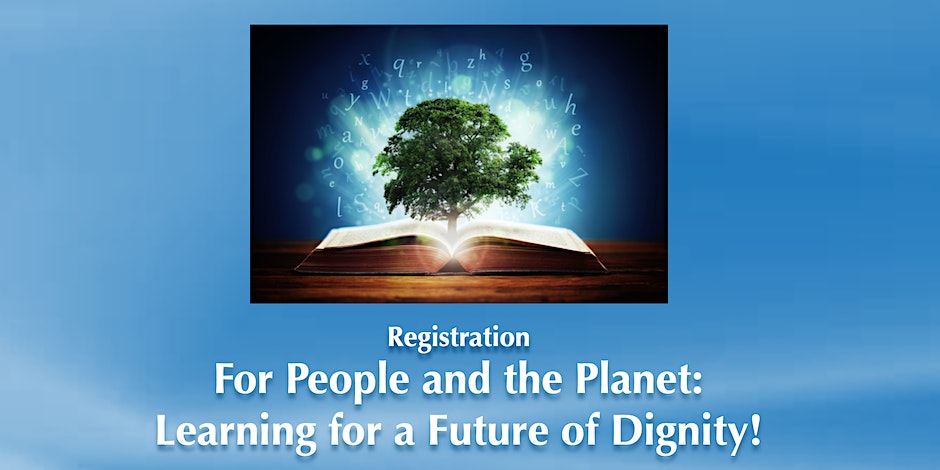Evelin Lindner and Linda Hartling presented a framework for the WDUi on Friday –
Learning for a Dignified and Dignifying Future — Evelin Lindner, Founding President of HumanDHS and Global Ambassador of the WDUi, and Linda Hartling, Director of HumanDHS
Evelin: The World Dignity University (WDU) initiative is an invitation by its founders to all educators and learners who wish to place dignity at the core of teaching and learning. The word university is derived from the Latin universitas magistrorum et scholarium, meaning „a community of teachers and scholars.“ The WDU initiative envisions returning to the original meaning of the word and form a universitas magistrorum et scholarium globalis, a global community of teachers and scholars, who share the aim of furthering dignity in the world. All like-minded educators and learners of the world are invited, whether they are part of local universities or not, to share their knowledge as a gift to the world.
Linda: The WDU initiative is an invitation to all who wish to walk the talk of dignity in mutually shared learning activities and experiences. The WDU initiative is dedicated to doing so by realizing the spirit and practice of dignity in all of its proceedings. It is an invitation to develop ideas for dignity within a global community, and to explore how those ideas can be turned into dignifying action.
The WDU initiative aspires to be a bridge-building space for learning, bringing together individual teachers and learners), in concert with supportive institutions, who share in this effort according to their ability, and where their gift is not measured and calculated.
The WDU initiative wishes to create a mutually beneficial community of educators and learners, that supports the personal growth and intellectual development of all involved. We like to think of the experience of the WDU initiative as a gift to the world.
The many benefits of the WDU initiative, especially for the educators involved, include:
• it provides a one-of-a-kind platform for global learning in a diverse community of learners and scholars
• it brings global attention to the important work of educators who put dignity at the core of learning
• it provides the opportunity for practical training in online learning and conducting dignilogues (dignity + dialogue)
• it provides the opportunity for mutual support within a community of dignity-minded people.
Evelin: Three points are particularly important:
1. Many people ask us about the „vetting process,“ meaning which courses will be offered. First, we answer, we do not use the terminology of „vetting.“ It all starts with developing a relationship of mutual support. We are looking for digni-educators who practice loving humility and sensitivity to their impact on others. We are not into product development but into loving co-creativity.
2. However, there are limitations for people to know who wish to contribute with offering learning programs to the WDUi. Most importantly, we need those who are willing and motivated to be self-directed in learning the WDUi platform.
Then there is the question of money. We acknowledge that people need livelihoods, and we support them in their efforts. However, we intentionally wish to develop our WDU initiative as a space outside of the money-making academic „business.“ We have worked tirelessly over the past decades to establish a climate of generous collaboration, unencumbered by competition for financial resources. We invite our friends to contribute according to their ability and no more — be it with giving their time, their knowledge, their skills, or creativity, and this could also include donations of money. If our WDU initiative went toward conventional monetization, it would not only undo the not-for-profit status of our work, it would also be profoundly humiliating, because it would disregard the enormous amount of labor-of-love work donated by hundreds of our community members over the past decades. Through our members‘ labors of love, a foundation of integrity has been built, integrity derived from precisely not monetizing our efforts.
We therefore invite all those friends into our WDUi project who deeply understand and value the generous action gifts of our community. As we move at the speed of dignity rather than at the speed of money, things unfold organically — we do not want to have them unfold at the rate of industrialized productivity as in money-driven operations — and we depend on everyone to lovingly see the benefit of carrying the difference. We invite all those friends who deeply acknowledge what money-driven operations cannot offer, namely, relational integrity. We forge the path of redefining what is „worthy“ work — our relational work is more worthy than what money can buy.
We invite all those friends who honor the fact that it is through others‘ generosity they receive extraordinary global visibility and credibility. Just to clarify the size of the donations offered so far, Linda left a high-paying job, and in my case, I live a precarious life without global health insurance while serving as our dignity work’s global ambassador to avoid burdening our network with expenditure. If money should be involved at all, we wish it to be in the form of donations, and the first donations should go to the dignity work itself. After that, participating educators can guide their students, if they want to, to their own private websites, where students could be invited to offer donations to their teachers.
We invite everyone who wishes to contribute to do so in a spirit of a gift economy. We are privileged to have the „mother“ of the concept of a gift economy in our community, Geneviève Vaughan. Also Howard Richards is an esteemed member in our community, have a look at his new book, Economic Theory and Community Development: Why Putting Community First Is Essential to Our Survival (Lake Oswego, OR: Dignity Press, 2022). You may also want to see Evelin’s book from 2012 on a Dignity Economy.
3. The most important requirement for participation is loving humility. Since this is not something one can learn from a person’s CV, or determine by giving out abstract guidelines, we need to give priority to relationship building. We wish to transcend the academic tradition of combative debate and detached objectivity, not least because these practices are informed by a misunderstood concept of science. Instead, we wish to make loving relationship building central also to our academic work. Philosopher Ágnes Heller warned that „masculinist models of consciousness objectify world order, obfuscating how fluid and continuously malleable it in reality is“ (in Everyday Life, London: Routledge and Kegan Paul, 1984). In other words, we wish to transcend masculinist models of consciousness in our work. We sympathize with philosopher Iris Murdoch, who said, „We need a moral philosophy in which the concept of love, so rarely mentioned now by philosophers, can once again be made central“ (in Existentialists and Mystics: Writings on Philosophy and Literature, Harmondsworth: Penguin, 1999, page 337). We sympathize with the concept of kama muta, Sanskrit for „moved by love,“ that anthropologist Alan Page Fiske and his team have developed.
Linda and I have almost twenty years of shared leadership experience. We are often asked, „Why don’t you do A or B or C?“ We answer, „Because we are far beyond that, we are at X, Y, Z.“ Through this, we have kept our work largely free of toxic internal strife for the past decades, at least to the extent that we can, which is unique, given that most similar organizations crumble from internal conflict triggered by competition for resources.
Linda: We have come to believe that a “World Dignity University” — a human-to-human network of networks — is a powerful and highly practical approach to realizing an inclusive and creative model of learning. As peace poet William Stafford notes: “The creative life of unknown people might be a tremendous hidden river.” And we need to follow that river if we are going to find solutions to the crises we are facing in the world today!
We envision the WDUi as a bridge-building learning community that unites scholars and learners in concert to put dignity at the core of learning, locally and globally! We wish to reach out to individuals who are integrating dignity into their efforts in many diverse ways, in concert with, for instance, the Morton Deutsch International Center for Cooperation and Conflict Resolution!
We invite educators, scholars, practitioners, activists, learners, and people from all walks of life, from all corners of the earth, to share responsibility for leading the world toward greater cooperation by joining in this endeavor. Though the world is drowning in a sea of information and “angertainment,” we seek to foster a mutually energizing space for „a deep ecology of thought,” inspired by philosophers Arne Naess and Elizabeth Minnich. His Royal Highness Prince El Hassan bin Talal of Jordan is leading the world toward a dignifying “cogitosphere,” a thought sphere that has the potential to generate life-saving solutions to the humiliating crises of sociocide, ecocide, and genocide.
Our dignicommunity wants “to learn our way to a better future,” as Board Member Michael Britton emphasizes. He suggests, “When it comes to wisdom and experience, what if all the world is our university?”
Kindly see more about the WDU initiative on our
• education page
• newsletter 12
• and in last workshop’s Pre-Planned Dignilogue #4: Plotting the Future of the World Dignity University Initiative

